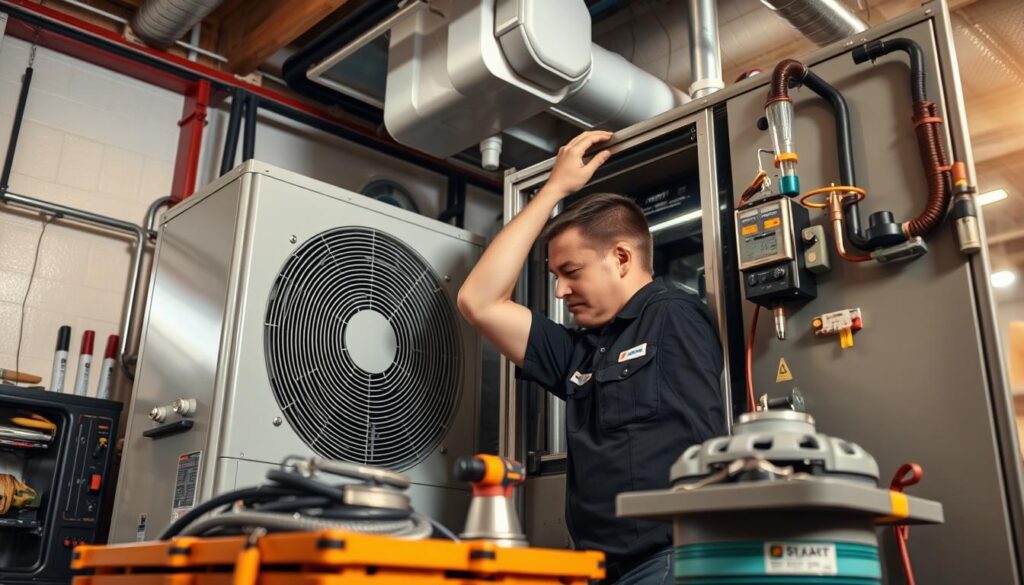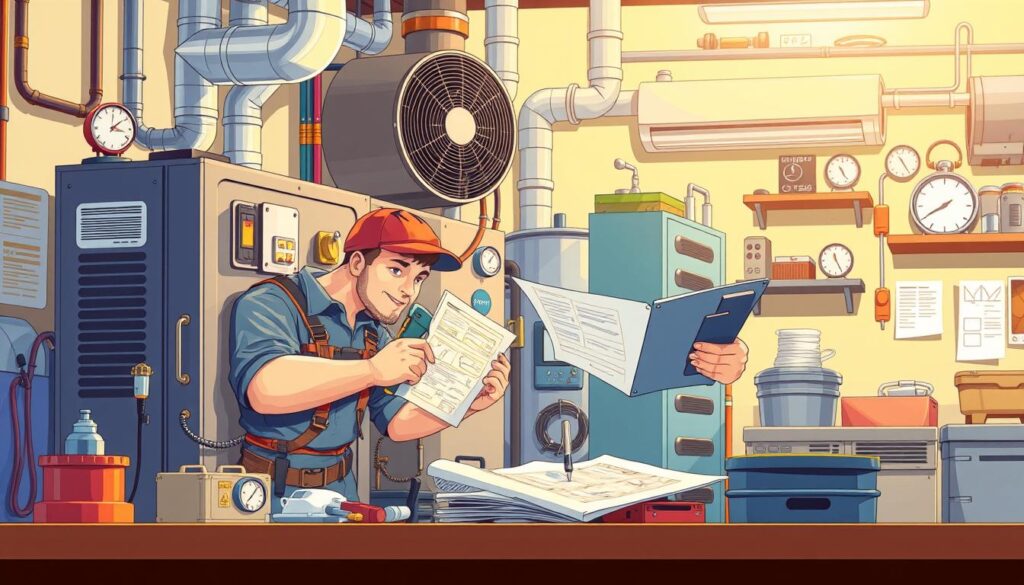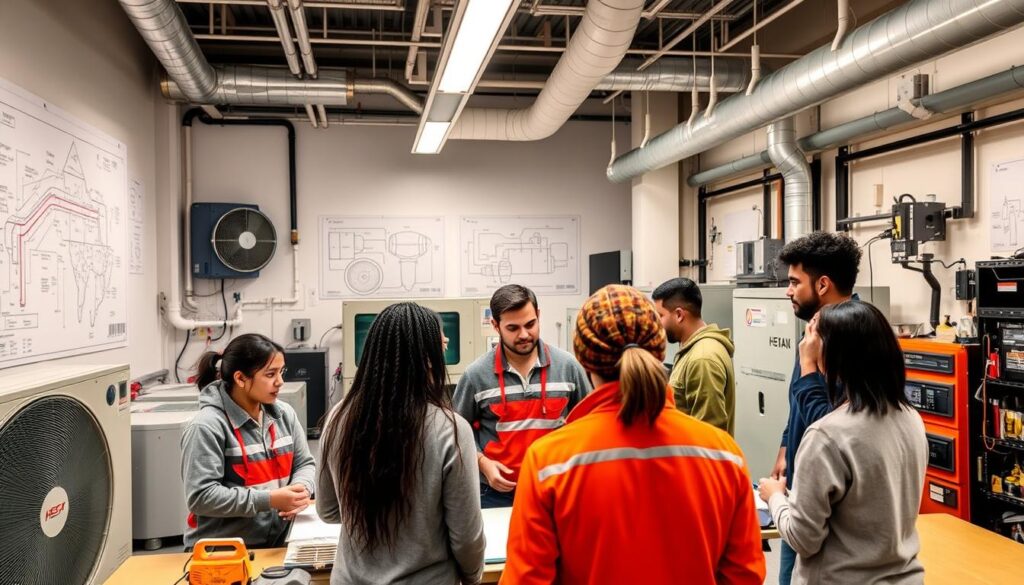Affiliate Disclosure
HVAC Guide Guys is a participant in the Amazon Services LLC Associates Program, an affiliate advertising program designed to provide a means for sites to earn advertising fees by advertising and linking to Amazon.
Can You Get a Master’s Degree in HVAC? Thinking about a master’s degree in HVAC? The HVAC world is changing fast. It now focuses on energy saving, smart tech, and being green. Getting advanced education could lead to new career paths and help you grow professionally. But, is it really possible to get a master’s in HVAC, and how would it help your career?

Key Takeaways
- HVAC is a growing field with projected job growth outpacing the national average.
- Master’s degree programs in HVAC offer advanced education and specialization opportunities.
- HVAC master’s programs typically span two years and offer flexible online or hybrid learning options.
- Earning a master’s degree can lead to career advancement in roles like HVAC consulting, project management, and teaching.
- The HVAC industry is rapidly evolving, with a focus on energy efficiency, smart technology, and sustainability.
Table of Contents
Understanding HVAC Career Pathways and Education Options
The HVAC (Heating, Ventilation, and Air Conditioning) industry is booming. It offers many career paths and educational choices. Whether you’re starting or looking to grow, knowing your options is key.
Traditional Education Routes
Typically, you start with a high school diploma or GED. Then, you take an HVAC certificate program. These programs last 6-12 months and teach skills like electrical systems and air conditioning. They prepare you for entry-level jobs.
Advanced Degree Possibilities
Now, there are more advanced degrees in HVAC. You can get associate’s or bachelor’s degrees in HVAC engineering or technology. These degrees give you a deeper understanding of HVAC systems and prepare you for advanced roles.
Industry Requirements
Requirements for HVAC pros vary by state. Often, you need an apprenticeship and certifications. Some states require licenses, which involve exams and experience. Keeping up with certifications and licenses can boost your career.
The HVAC industry has many career paths, from technician to management. Knowing your education and industry needs helps you grow. It opens doors to new opportunities and success.
Explore Our HVAC Shop
Looking for top-rated HVAC tools, parts, and accessories? Visit our shop and find the perfect solution for your needs.
Visit the ShopThe Role and Responsibilities of HVAC Professionals
HVAC (Heating, Ventilation, and Air Conditioning) professionals are key to keeping buildings comfortable and safe. They work in homes, offices, and factories. Their tasks help these systems run smoothly.
As an HVAC tech, you might read blueprints and use special tools. You’ll fix and keep HVAC systems running right. This includes wiring, testing, welding, and finding leaks. You also have to follow rules for handling dangerous fluids and gases. Plus, you’ll need to explain complex systems to homeowners in simple terms.
- Troubleshoot and diagnose issues with HVAC systems
- Perform routine maintenance, such as cleaning filters and checking system efficiency
- Install new HVAC equipment and systems, following blueprints and safety protocols
- Safely handle and dispose of refrigerants and other hazardous materials
- Provide excellent customer service by communicating technical information clearly
HVAC techs are always in demand. They’re needed for installation, upkeep, and fixes in homes and businesses. With the right training and experience, they can earn good pay and have a rewarding career. The HVAC field offers many chances for growth and advancement, whether you focus on air conditioning, heating, or ventilation.
| HVAC Technician Duties | HVAC Job Responsibilities |
|---|---|
| – Read blueprints and technical diagrams – Use specialized tools and equipment – Repair and maintain HVAC systems – Test electrical circuits and components | – Ensure proper functioning of HVAC systems – Comply with regulations for handling fluids/gases – Explain complex systems to customers – Provide excellent customer service |
“The HVAC industry offers job stability due to the constant requirement for HVAC services to ensure climate control in buildings.”
Explore Our HVAC Shop
Looking for top-rated HVAC tools, parts, and accessories? Visit our shop and find the perfect solution for your needs.
Visit the ShopCan You Get a Master’s Degree in HVAC?
Traditional HVAC education usually focuses on certificates and associate degrees. But, the industry is changing. Now, some schools offer advanced degrees in HVAC-related fields. These programs let HVAC pros grow their skills, mixing technical knowledge with business, engineering, or energy studies.
Available Master’s Programs
The Master of Science in Mechanical Engineering with an HVAC focus is offered by Penn State World Campus. It’s a two-year online program made for HVAC prep. It boosts students’ skills and knowledge in this field.
The Master of Science in HVAC Engineering Technology at the University of Michigan is ABET-accredited. It takes four years to finish. This program covers HVAC system updates, energy efficiency, and project management.
Curriculum Overview
Master’s programs in HVAC cover advanced HVAC design, system optimization, and energy management. They also include project management. Students might learn about new tech, like smart HVAC systems and digital design tools.
Admission Requirements
To get into these master’s programs, you need a bachelor’s degree in a related field. This could be mechanical engineering, building science, or HVAC technology. Work experience in HVAC is also key. You might need to send in transcripts, letters of recommendation, and sometimes test scores.
Getting a master’s in HVAC opens up new career paths. It boosts your technical skills and puts you at the leading edge of the HVAC industry.
Explore Our HVAC Shop
Looking for top-rated HVAC tools, parts, and accessories? Visit our shop and find the perfect solution for your needs.
Visit the ShopEssential Skills and Knowledge Required for Advanced HVAC Studies
Advanced HVAC studies need a strong base in technical skills and knowledge. HVAC pros must know the basics of heating, ventilation, and air conditioning. They also need to be good at physics, math, and computer science.
To do well in advanced HVAC studies, students need to be experts in several areas:
- HVAC Principles and Systems: Knowing how HVAC systems work is key. This includes refrigeration, heating, cooling, and air distribution.
- Mathematics and Physics: A good understanding of math, like algebra and geometry, is important. Also, knowing thermodynamics and fluid mechanics is crucial.
- Electrical and Controls Systems: Being skilled in electrical systems is vital. This includes circuit analysis, wiring, and control systems for modern HVAC equipment.
- Blueprint Reading and Technical Drawing: Reading technical diagrams and blueprints is essential. It helps in designing, installing, and maintaining HVAC systems accurately.
- Problem-Solving and Critical Thinking: Advanced HVAC studies require strong analytical and problem-solving skills. These are needed to solve complex system issues.
- Customer Service and Communication: Good communication with clients, colleagues, and others is key. It ensures quality service and teamwork.
By mastering these HVAC skills, advanced HVAC knowledge, and HVAC expertise, students can find many opportunities in the HVAC industry.

“Investing in advanced HVAC education is crucial for staying ahead of the curve in this rapidly changing industry. The skills and knowledge gained can open doors to exciting career paths and leadership roles.”
Explore Our HVAC Shop
Looking for top-rated HVAC tools, parts, and accessories? Visit our shop and find the perfect solution for your needs.
Visit the ShopCareer Growth Opportunities with Advanced HVAC Education
Getting an advanced degree in HVAC opens doors to many career paths. HVAC pros can move beyond the usual technician role. They gain specialized knowledge and skills for growth and advancement.
Management Positions
Management roles are a big opportunity. HVAC pros with advanced degrees can lead teams, manage daily tasks, and run HVAC businesses. They use their technical know-how and develop leadership and planning skills.
Consulting Opportunities
Consulting is another path for HVAC career growth. Skilled HVAC pros offer advice on complex systems, energy efficiency, and sustainable design. Consulting lets them work with various clients and projects, broadening their industry knowledge.
Teaching and Training Roles
For those who love to share their knowledge, teaching and training are rewarding. HVAC pros with advanced degrees can teach at vocational schools, community colleges, or in-house programs. They pass on their skills and knowledge to future HVAC technicians.
| HVAC Career Advancement Opportunities | Key Responsibilities |
|---|---|
| Management Positions |
|
| Consulting Opportunities |
|
| Teaching and Training Roles |
|
Advanced HVAC education unlocks many career paths. From management and consulting to teaching and training, HVAC experts can grow. They use their technical skills, deepen their knowledge, and make a big impact in the field.
HVAC Industry Certifications and Licenses
Getting the right certifications and licenses can boost your skills and career. The North American Technician Excellence (NATE) certification is very well-known. It shows you know a lot about HVAC systems and how to do things right.
There are also other certifications for things like working with refrigerants and certain equipment. These show you’re an expert and can lead to more job chances.
You might need an HVAC license to work legally in some places. These licenses require passing tests on HVAC systems, safety, and rules. Getting the right licenses means you can work more places and might even make more money.
Going for HVAC certifications and HVAC licenses shows you’re serious about your job. It doesn’t matter if you’re new or have been doing this for years. Getting certified can really change your career for the better.
“Certifications and licenses are the hallmarks of a true HVAC professional. They showcase your expertise and commitment to safety and excellence.” – John Doe, HVAC Industry Expert
The NATE certification is very respected. Many employers look for HVAC techs with this certification. Getting the right certifications and licenses can make you stand out and help you succeed in the HVAC world.
Explore Our HVAC Shop
Looking for top-rated HVAC tools, parts, and accessories? Visit our shop and find the perfect solution for your needs.
Visit the ShopSalary Expectations and Job Market Analysis
Thinking about a career in HVAC? It’s key to know the salary and job market outlook. HVAC technicians in the U.S. earn a median of $50,590 a year. As you gain experience and education, your earnings can rise.
Regional Salary Variations
HVAC salaries vary by region. States like California, New Jersey, and Washington pay more. For instance, entry-level HVAC techs in San Francisco earn $62,000, while in New York City, it’s $58,500.
Industry Growth Projections
The HVAC industry is set for significant growth. The U.S. Bureau of Labor Statistics predicts a 6% growth rate by 2032. This is faster than the average for all jobs. It means there will be 37,700 new job openings each year.
Several factors are driving this growth. The need for energy-efficient systems, maintenance, and smart home technologies are key. With the industry evolving, those with advanced education and skills will have strong job prospects.
Alternative Educational Paths in HVAC
There are many ways to start an HVAC career, not just a four-year college degree. HVAC apprenticeships, vocational training, and online courses are great options. They offer different ways to learn the skills needed for this field.
HVAC Apprenticeships
HVAC apprenticeships last 3-5 years. They mix on-the-job training with classroom learning. You’ll learn to install, repair, and maintain systems.
These programs are offered by unions, trade groups, or companies. They help you get certified and licensed in the field.
Vocational Training Programs
Vocational training is another choice. It’s offered at trade schools and community colleges. These programs focus on practical skills.
Students learn through a mix of classes and hands-on training. They can earn diplomas or associate degrees in HVAC technology. This prepares them for entry-level jobs.
Online HVAC Programs
Online HVAC programs are becoming more common. They use virtual reality (VR) for learning. This lets students practice skills through digital simulations.
These programs are great for those who can’t attend classes in person. They’re also good for working professionals looking to improve their skills.
Choosing the right path is important for HVAC careers. You need technical skills, attention to detail, and problem-solving abilities. Exploring different training options can help you find the best fit for your career goals.

“HVAC careers can provide a stable and rewarding career path for those with the right skills and training.”
Explore Our HVAC Shop
Looking for top-rated HVAC tools, parts, and accessories? Visit our shop and find the perfect solution for your needs.
Visit the ShopCombining Business Management with HVAC Expertise
As an HVAC pro, your skills are very valuable. But, adding business management to your HVAC knowledge opens up new doors. Advanced HVAC education mixes technical skills with business smarts.
Learning about HVAC business management and HVAC entrepreneurship teaches you marketing, finance, and more. It’s all tailored for the HVAC world. This way, you’re ready to be a top technician and maybe even run your own HVAC company.
Want to rise in your career or start your own HVAC business? Knowing both the technical and business sides is key. The HVAC job market is growing fast, with a 15 percent job increase expected by 2026, says the Bureau of Labor Statistics as of January 2019.
| Pathway | Typical Duration | Key Benefits |
|---|---|---|
| HVAC Certificate or Diploma | Less than 1 year | Quick entry into the workforce |
| HVAC Apprenticeship | 3 to 5 years | Hands-on, real-world learning |
| Associate’s or Bachelor’s Degree in HVAC | 2 to 4 years | Expanded service offerings and business opportunities |
By mixing your HVAC skills with business knowledge, you’re set for a great career. Whether you dream of leading big HVAC projects or starting your own HVAC business, the right education can help you get there.
“I transitioned from being an HVAC technician to becoming an entrepreneur and semi-retiring. I continue to do side jobs for friends, family, and the church even after semi-retirement. I’ve enjoyed the HVAC trade immensely and it’s had a positive impact on my life.”
Technology and Innovation in Modern HVAC Education
The HVAC industry is always changing, and so is how we learn about it. Now, HVAC technology and new ways of learning are part of HVAC classes. This helps students get ready for the fast-paced world of HVAC.
Digital Tools and Software
Today’s HVAC classes use digital tools and special software. Students learn to use CAD for designing systems, tools for finding problems, and software for saving energy. Knowing these HVAC software tools helps them meet the tech needs of the HVAC world.
Smart HVAC Systems
Smart HVAC systems are now part of HVAC education too. Classes might cover BIM and how HVAC systems work with home automation and IoT. Learning about these HVAC technologies gives students an advantage in the job market.
By adding technology and innovation to HVAC education, we make sure graduates can handle the changing HVAC world. They can help make buildings more efficient, sustainable, and smart.
Conclusion
The HVAC industry is full of promising career paths and educational choices. While traditional programs are still key, advanced degrees like master’s are becoming more common. They offer chances for career advancement, better pay, and specialized skills.
The HVAC field is growing fast, thanks to a focus on energy efficiency and new technologies. This makes it a great choice for those looking for a rewarding career. Whether you go for a traditional HVAC program or an advanced degree, learning the right skills can lead to a fulfilling job.
With education, practical experience, and certifications, you can thrive in the HVAC industry. You’ll enjoy the perks of HVAC career prospects and advanced HVAC education benefits. The future looks bright for those eager to make a difference in heating, ventilation, and air conditioning.

